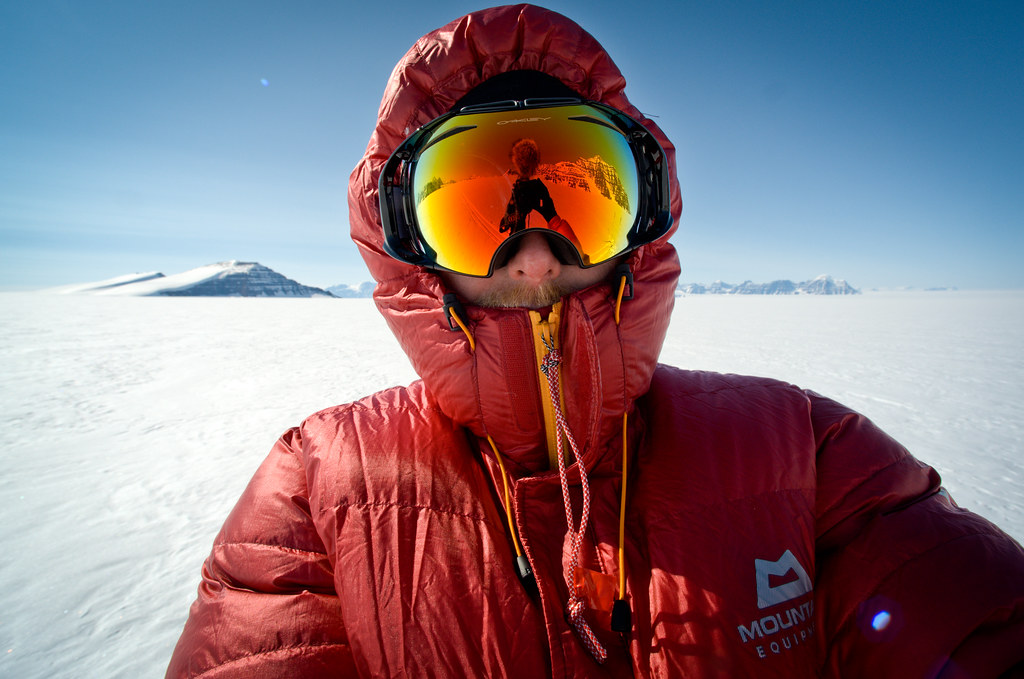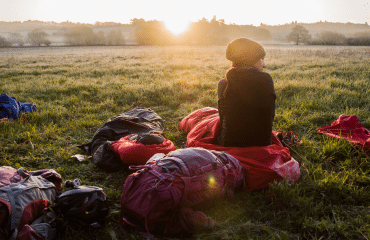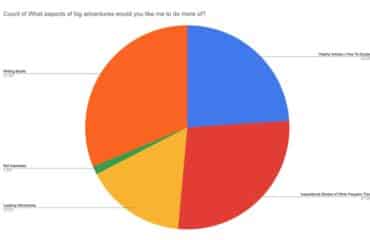An interesting piece on the BBC today about what adventures are actually left.
Here are a few snippets.
Genuine firsts in exploration are getting hard to find. The world’s greatest peaks have all been climbed.
The earth has been circumnavigated many times by plane, foot, bicycle and balloon, among other means of conveyance. Many of the major rivers, lakes and seas have been swum or canoed.
There are few genuine unknowns. Satellite navigation technology allows mankind to see almost every river, copse and hill.
Machines can do the lifting and keep adventurers connected.
Exploration today is a dying art. The new feats are often about endurance as much as discovery. Firsts are ever more specialist and technically defined – first successful scuba dive at the north pole (Michael Wolff), first person to jetpack across the English Channel (Yves Rossy), oldest woman to climb Everest (Tamae Watanabe).
So is there anything left to do? Something combining that potent mix of danger, novelty and a clearly defined natural barrier to overcome.
Here is a good example of how the ‘firsts’ become ever more convoluted as time passes.
- First to reach south pole: Norway’s Roald Amundsen in 1911 (pictured)
- First solo expedition: Norway’s Erling Kagge, 1993
- Fastest kite-assisted journey: Norway’s Borge Ousland, 1996
- First balloon flight: Austria’s Ivan Andre Trifonov, 2000
- Oldest person: UK’s Simon Murray, aged 63 years and 309 days, 2004
- First woman to ski alone across Antarctica: UK’s Felicity Aston, 2012
- First to ride a bike: UK TV presenter Helen Skelton, 2012
Not for the first time, I agree with Benedict Allen’s opinion:
“exposure and vulnerability is incredibly valuable.”
And for that it does not matter particularly if you are the first or the fifty-first person to do it. Nor does it matter if you are pushing your limits in Bhutan or in Berkshire.
So I do not believe that adventure is dead, and I certainly am not disheartened that I was not born 200 years ago. I can still seek adventure, plus I can share the stories in more colour, more detail and to a wider audience than at any previous time in history.
What do you think? Have your say in the comments below.




Pieces like this will keep appearing for as long as we cling to the musty relic that is the Edwardian explorer stereotype, setting forth from a small north-Atlantic island in order to conquer the known universe and return victorious.
This has as much to do with the people prolonging the stereotype with their actions as the people writing and publishing stories about them.
Humans are capable of incredible feats in the face of adversity, overcoming physical and mental demons against all odds. We know. Isn’t it about time the community moved on and grew up a bit?
Humans are also capable of incredible feats of music / art / literature. We know. Isn’t it about time the community moved on..?
– Best Wishes,
Devil Advocate…
Adventure is a state of being, so how can it be dead?! If you open your mind to the possibilities, there’s adventure to be had just about everywhere. It might not be cutting-edge, ground-breaking, adventure, but does that really matter? No, not at all. If adventure is dead, then every one of us is in for a very boring existence.
Also, exploration is far from dead. We’re on the verge of a whole new frontier of exploration thanks to the privatisation of the space industry. It won’t be too long until you’ll be able to embark on a career as a commercially-employed astro-explorer. How cool would that be?!
I agree with Neil Cowburn here: an adventure is a state of being to do with going to the edges of one’s own experience. It is not about ‘new challenges’, in absolute terms, at all. Adventures are always challenges between individuals and situations they put themselves in, irrespective of whether others have been that way before. Every true adventure is unique in that respect. (I’ve written a book about one such adventure recently.)
While there is no fame in “claiming” a summit that had been climbed by others, there is still immeasurable value is personal achievement. Why should it be necessary for our endeavours to have meaning in a global context? I derived incredible satisfaction from finally realizing my childhood dream of standing at the North Pole. But even I got caught up in the craze of “I need to make this achievement some kind of first.” I may have been the first woman to unfurl the national flag of my Ukrainian heritage at the geographic North Pole, but did doing so change my own inner emotions in any way? Did it make the experience itself any richer or somehow more relevant? No. To today’s legitimate explorers, I believe that adventure is ultimately much more a personal journey into who we are or strive to be at our core than one for fame and glory.
The definition of the term “exploration” has been stretched out and kneaded to such a degree that its true meaning has been sadly diluted. In its purest sense of the term, adventure can be viewed as dead. Do we really need validation from the community at large for our endeavours? I personally place great value on my own firsts, my climb to the summit of Mt. Parnassos as one example. Elevation-wise, the mountain is a minor one, yet it was my own first summit, and if that effort had meant nothing, I would not still be wearing a small stone from the top on a necklace 16 years later. It defines who I am as I view myself. It is a talisman of sorts. Climbing to the top was a challenge I set for myself, and my pride is in having overcome my own fears and fatigue and massive altitude headache. The fact that only a few dozen people ever heard me tell the story in no way diminishes its significance – to me. Each of my achievements changed me and made me believe in my own prowess, fortitude and perseverance. Each was a deeply intimate benchmark.
Though my individual ‘feats’ are miniscule by comparison to Felicity Aston’s incredible Antarctic achievement for example, I learned quite a lot about myself that I would never have known otherwise. Each of these personal firsts is a new point of reference – waiting to be bested. Therein lie the reasons for *my* adventures…. minor on a worldly scale, but nevertheless consummately valid, worthwhile and poignant to my own identity.
Instead of feeling the need to conquer something… we should come to understand that deepest fulfillment and gratification is found in individual and personal triumph.
Moki – you have done some fabulous adventures!
I have, Al, and am proud of my own achievements for what I had endeavoured to do at the time. Personal bests are bests after all. It was exploration of “possibility,” of “probability” and “capability.”
One of my favorite quotes (and one I strive to live by) is by Robert Schuller: “I’d rather attempt to do something great and fail than to attempt to do nothing and succeed.”
There! ‘Nuf said!
Agreed – Adventure is not dead, adventure is in your head.
It’s just a stereotype as Tom says. In a way it would be nice if all the “firsts” were done then the stereotype might evolve.
For me, adventure should be designed around a person rather than a gap in the guinness book of records (or not designed at all to heighten the feeling of adventure!). Furthermore if you ask yourself: “would I do this if no one knew about it?” then the answer should be 100% yes. And with that sentiment (not caring what anyone thinks) – that article becomes irrelevant. It’s subjective propaganda showing a very narrow view of what adventure is to further propagate the mainstream stereotype.
One day they’ll say music is dead because Justin Bieber occupies every chart position every week; but I won’t lose any sleep at night because I know music will never die and neither will adventure.
“Adventure; to engage in exciting or hazardous activity”
How can that die?
As long as there are exciting and hazardous activities there will be adventure.
The previous posters are bang on.
When will we stop conflating adventure with Imperialist exploration? And when will we admit that exploration can be subjective, philosophical, and cultural, and doesn’t have to be about …ests anymore. There’s not much point to blithe endurance and stoic domination.
It is the worn out stereotype that should be retired; the boys’ own hero who’s objective was to conquer and dominate wilderness rather than to experience, and understand places and to gain a better understanding of our relationship to them as a result.
I totally agree with the above points, and think the question: “When will we stop conflating adventure with Imperialist exploration?” is a great one to ask! I have been guilty to some degree of looking at past explorations through a romantic lens, at times glossing over a tone of superiority that existed. The need to have ‘adventures’ is surely a human trait, a way of exploring our own minds & bodies, learning, sharing, developing (heck, maybe even evolving) – and therefore it does not matter whether we go to, “Bhutan or in Berkshire” – it should not be denied from anyone. Great post.
Why does an adventure have to be a first? There’s plenty out there if adventure rather than fame is the goal. If you’re looking for a first, though, how about a solo, unsupported descent of the River Lena by packraft? I double dog dare you!
The Lena has been on my To Do list for years!
well, just maybe I’ll beat you to it 😉
Should read “what firsts are actually left” adventure is everywhere!
The way I see it, there is adventure, exploration and “firsting.” Adventure is very personal and starts at different levels for everyone. For some it’s a simple hike, for others it’s a free-solo, for others it’s a trip into the unknown. What I may consider adventurous for me, some may not consider so for themselves and vice versa. As long as people are pushing past their comfort zones and seeing what they are capable of (even in tiny steps), it’s a good thing and they should be commended.
I think individual exploration is grinding to a halt, tho. The days of loading up your pack and trekking into the wild unknown hoping to see what is there while you hope to simply come out the other side are about over. The oceans are the new jungle and the costs of exploring that are way too much for the amateur explorer. There are still unexplored regions in the Amazon, Columbia, New Guinea – and the frozen and the desert lands. But less accessible to the self-funded explorer. Not that there are not still opportunities, just fewer and fewer.
Then there is the firsting. It reminds me of when I was a competitive thrower. For years it was just an open class. But people were not content to just participate- they wanted accolades. So it was divided to divisions based on ability. Then by weight. Then by age. Then by age again. Eventually, what used to be one winner of a games became twelve different winners as everyone wanted their recognition. Instead of just enjoying the effort, it was more important to be presented as the winner of the under 190lb, B level, Masters, age 42-45 class. Pfffft. Meaningless. If you are the first to do something, you are the first. First to cycle across something, first to climb up something, first to paddle down something. Then break it down some. First solo – awesome. First female – excellent. First unsupported – very nice. First for a particular country – hmmm.. sure. First to do it without supplemental oxygen – ballsy. First to do it in shorts? First to do it with a kite? On a unicycle? After a while, it starts to look like they are really stretching to get noticed. It becomes much less impressive the farther it gets from the original accomplishment and it appears they are done not for personal achievement but for notoriety.
This being written while in the midst of my current “adventure.” Two month cross country explore in a travel trailer with a wife and 3 kids. It’s not rowing across the Pacific, but it’s put me way outside my comfort zone and provided a ton of microadventures.
… for an Average Joe like myself and most of my readers, adventure is – ” something that’s new or different that isn’t an everyday occurrence”…when you’re trying out something new for the first time, this is YOUR OWN VERY FIRST ASCENT…THIS IS YOUR ADVENTURE !
Thought provoking post Al, cheers, as usual some wonderful comments too.
We live in a finite world, so naturally the list of “firsts” has dwindled. However I totally agree with the previous comments about exporation being a state of mind and about challenging oneself to do remarkable things, that’s true exploration – not necessarily who can gain the most sponsorship and exposure – something I think this site has really highlighted. adventure is dead, long live micro-adventure!
I’ve just spent 4 days camping and canoeing down the well known and beautiful River Wye in the UK with 3 friends. We were not the first, in fact on the Saturday there were dozens of other like-minded canoeists and kayakers paddling down it just like us. But it was an adventure to all four of us involved.
One guy had never camped before, all of us had never been in a Canadian Canoe before, and the thought of paddling 30 miles over two days laden down in a canoe with 65 litre rucksacks full of tents, stoves and sleeping bags etc was a little daunting at times.
We nearly capsized on several occasions, run aground twice, narrowly avoided getting decapitated by a Weeping Willow but still made it to the Inn for lunch.
My point though is simple, on Monday sitting at my desk at work I knew that I had had a little adventure over the weekend even though it’s not a first, or a feat of endurance (although my aching shoulders may disagree) we did not explore anywhere new in the world, discover a lost tribe or city but we all had a personal adventure.
Adventure is a state of mind and subjective to the individual and so long as humans strive to seek out and do something new or beyond their personal comfort zones then adventure will always live! It cannot possibly die!
I blow a raspberry in the direction of all the nay-sayers!
Adventure isn’t dead. It just changed it’s face. Years ago it was planned out expeditions. Today adventure is someone getting onto a bicycle and cycling around the world on their own. We should embrace the change and be grateful that maybe now, more than ever, adventure is achievable for more of the world than ever before.
Adventure is extending yourself by physical achievement and pumping the adrenylin. For me it is cycling, for my daughter it is kite surfing and her hubby it is mountain climbing.
For whats it’s worth the Congo has now been fully navigated but just not on one go. A team of kayakers completed the Inga Rapids last year which was the last remained un-navigated section!
Cheers,
Graham
Great line of conversation, Al, and some valid points. This obsession with ‘firsting’ has become comical. Exploration is not dead, but perhaps the wilderness DVD is! It’s interesting how technology made it possible for me to start self-filming my (usually solo) remote river explorations in 2004 – lightweight cameras, then GoPros, plus relatively cheap home computer editing systems. I could produce serious wilderness documentaries as a total one-man effort, with exceptionally watchable results. Fast forward 8 years, and technology has brought us YouTube, online streaming, shorter human attention spans and Video-On-Demand. Great? Not if you still make wildereness DVDs – nobody is much interested in them anymore. I also find that the ‘simple’ exploration is on the wane. Now it’s about using a jet ski, an ultralight or a stand-up paddleboard. Fortunately, we now have the packraft, which brings a versatility to lightweight exploration that really opens up some new possibilities.
When I went up tributaries of the Rewa river in Guyana last year, most had never seen a human in any recent history. And I know of at last one more river in the area that absolutely no-one has been up, including the local Makushi people. So there are still a few gaps in the maps left. Canada, too. I’ll be visiting some unnamed coastal creeks in the Kimberley here in Australia next year that are similarly untouched and unknown.
The main problem is that we need to look at the earth with a sense of reverence and custodianship, rather than as some sort of personal playground. As I like to say, the planet is not a theme park.
Cheers, Kevin Casey
Remote River Man
It’s an enormous topic which really needs to be broken down and debated in parts, but as a quick observation from my jet-lagged brain:
The list of increasingly convoluted firsts of decreasing significance does paint the picture it intends to – whether with an intentional agenda or just through accidental reflection of what the media concentrates on.
It could easily have been written with the inclusion of some of the genuinely special modern-era journeys and removal of the media-friendly celeb trips etc. Like stats, a heavily-abridged list like this can support any view you like, depending on its content and omissions.
There’s plenty of exploratory journeying (real, not ridiculous made-up stuff) to be done. Enjoy it.
Like many of you, I think there is a lot packed into this piece. On one scale, adventures can, in small part at least, be found at the end of the lane. On the other, there is the grand scale of doing what has never been done before. I’m for anything gets the pulse racing for all of us. There is still much of the world with wild places and perhaps a greater hunger than ever to experience something greater than the average day. Adventure is not dead. The challenge against ones own limits are still as real as ever…
Classic exploration might be on its death bed, but adventuring is more alive than ever. Exploration is a communal thing, adventure is deeply personal. Irregardless of people having cycled to nynäshamn before – it was a first for me and hence an adventure of sorts.
The author of the piece could as well have said that ‘science is dead’ because we have a few neat answers to sciencey questions. Or music is dead becase we have some great music to humanity’s name. And so on… I would say that just like science, the more I adventure and explore the more I want to – in differing shades or formats, but with the essential drive the same whether I am crossing an ocean alone for months at a time on a unique path in time and space (haven’t run into any other rowers while I’ve been out) or plodding through a local known wood on a trodden footpath with pals.
It is a subjective field – what one person deems as worthy or notable may mean absolutely nothing to A N Other. But agreeing with the above that it is a mindset and mind state and experience unique to each of us that counts.
Not everything needs a label or a category or a placing in this life and certainly if adventure or exploration were dead then we surely would know all that there ever is to be known about the world and all the stories about it and our experience of it would be told.
What a ridiculous article! I wonder if the author herself/himself would like an adventure….
Firsting is not at the core of exploration but let’s be honest there are so many firsting oppotunities still out there. Look at the Behring Sea, Kasachstan, the Russian East. I am a freediver, shark scientist and and standup paddle boarder. There are many places nobody has ever supped before or explored freediving: Parts of Tasmania, Alaska, south west of New Zealans. And by the time we have dived with all sharks and marine creatures in all these places it will be 2100 and the oceans will have completely shifted, meaning these places have to be reexplored. I am sure this applies to many other adventure sports and science fields as well. Thanks for the post Al, really enjoy your content.